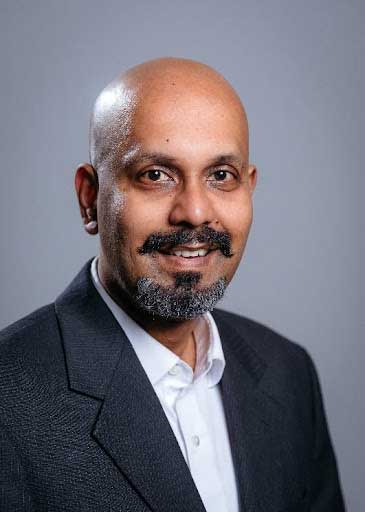 Mohan Thirumalai, PhD
Mohan Thirumalai, PhD
Assistant Professor, Department of Health Services Administration
School of Health Professions
With a career spanning across four decades, Dr. Mohan Thirumalai has paved the way for groundbreaking research at the cross-section of medicine and technology. Thirumalai joined the UAB/Lakeshore Research Collaborative before its surname ever included UAB or Lakeshore. The young Thirumalai came aboard the Collaborative with Dr. Jim Rimmer as a graduate assistant in 1999 at the University of Illinois at Chicago (UIC). In the beginning, the researchers laid the groundwork at UIC for the incredible breadth of work they conduct to this day.
The researchers got the funding for the first iteration of their Rehabilitation Engineering Center, more commonly known as RecTech, in the early 2000s, which is when Dr. Thirumalai joined full time. After 12 years together at UIC, Rimmer and Thirumalai brought their unique research center to UAB, where they’ve been ever since. Thirumalai’s work now includes three of his own federally funded grants, as well as about 10 others on which he serves as an investigator.
The driving motivation behind Dr. Thirumalai’s work, regardless of the grant or study, is to bring intervention and healthcare to people who otherwise wouldn’t have access to it. “Every project of mine I’ve tried to conceptualize for an audience and situation where there is no alternative available,” he said. When Thirumalai or other experts in the field say intervention, they mean there is a need for a given population of patients not being met in which he provides a routine, regimen and goals.
For example, one of his more passionate studies provides a diabetes management program in which subjects meet with health coaches, track progress on an app and sync resources to Alexa or other methods as such. This program is the first of its kind for diabetic patients. “There are pockets of diabetes prevention programs here and there, but they’re not accessible, they’re not inclusive and so on,” Thirumalai explained.
These aspects of accessibility and inclusivity are critical to Dr. Thirumalai’s work. Without a more inclusive approach, countless patients fall through the gaps. He has an especially strong focus on including people with disabilities, which is aided in large part by working alongside the Lakeshore Foundation. “There are interventions for people without disability, but people with disabilities cannot always participate fully in an inclusive manner because none of the material, none of the approaches are really catering to people with disabilities,” Thirumalai said.
Another one of Dr. Thirumalai’s projects is looking to focus on chronic pain management – again, with an emphasis on those with disabilities. Through his projects, Thirumalai noticed an area of need that has now grown into a project of its own to look at scalability of intervention programs. “Where I’m focusing is on how to leverage technology such that the human effort is minimal, so that using that same constant amount of workforce, we can reach a larger number of people.”
As is the case with many of the other researchers at The Collaborative, Dr. Thirumalai looks not just to create a great intervention program, but also to design it so that it is self-sustaining. He doesn’t want programs to end with the conclusion of the grant when the results are promising.
Dr. Thirumalai’s third project as PI isn’t necessarily geared toward people with disabilities, but it is still influenced by a desire to meet the needs of underserved populations. In this project, he is bringing diabetes management to rural parts of the state to people who don’t have Internet access. “My role has slowly and steadily helped get interventions out to the real world, which if not, would have just stayed in a lab.”
Through his contributions to NCHPAD and RecTech, Dr. Thirumalai’s work has been used as intervention for over 100,000 people – equal to a full Bartow Arena, 12 times over.
This driven researcher makes no qualms about it. Thirumalai may be one of the top tech researchers in his field, but he’s not a computer scientist or hardcore engineer. Stationed in the School of Health Professions, he’s not a health researcher. “I’m in this happy middle zone where I bring all the required health experts, then bring all the technology experts to create programs in places where I think we can have maximum impact.”
Among his numerous accomplishments, Dr. Thirumalai created NCHPAD’s first online medical intervention program, which, based on its success over the past two years, will clearly play a significant role in the future of medicine. Thirumalai can recall distinctly when it clicked all the back in 2012 when one of the students he worked with was reading off comments to him from participants.
“It was so very gratifying to see the impact that program had on people,” he said. “The direct impact we are able to have on people with disabilities is very obvious here. There are so many things we are and can be doing.”

